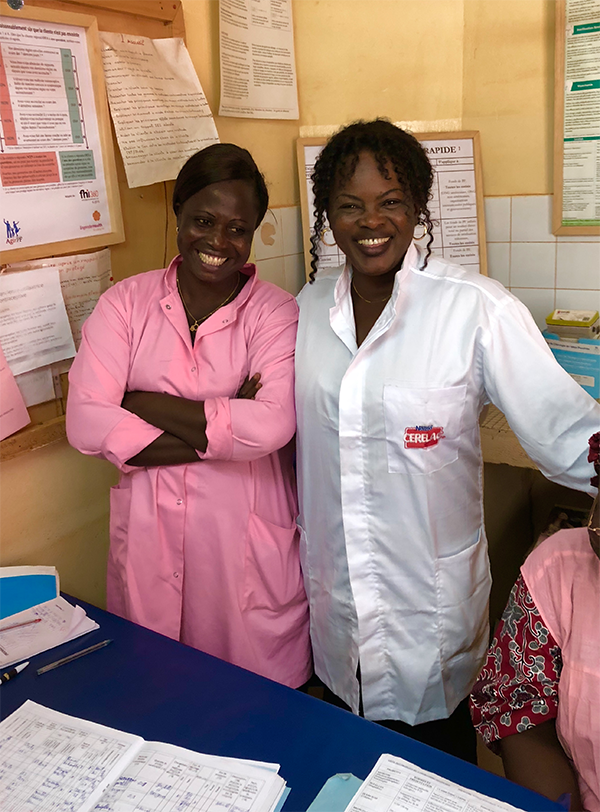
Family planning providers at the Bogodogo Health Center in Ouagadougou proudly show their registers with recorded universal family planning referrals and new acceptors. Photo credit: Laura Hoemeke, Interim Chief of Party for Francophone West Africa (FWA) Hub
Between April and June 2018, 16% of women who came to the Bohicon Health Center in the Zou Commune of Benin for a variety of maternal and child health preventive and curative services left with a modern contraceptive method.
This percentage is expected to rise once health facilities implement universal family planning referrals – the principal high-impact family planning approach of The Challenge Initiative’s Francophone West Africa Accelerator Hub. Through the universal referral approach, every woman of reproductive age who comes to a health facility is systematically counseled on family planning and referred to the family planning room within the facility, regardless of the health service that brought her to the facility. Training of trainers and of health care providers on the approach will take place in August 2018.
In the Bohicon Health Center, a small family planning room exists with two full-time family planning providers providing a full range of modern contraceptive methods. The family planning providers indicate the preferred method among women who visit the facility is implants, followed by injectables. One of the providers explains that women see implants as financially advantageous and cost-efficient, and they like the fact that they don’t have to return as often to the health center as they do with short-acting methods.
The situation is similar in neighboring Burkina Faso. In downtown Ouagadougou, two health care providers at the Bogodogo Health Center who offer family planning services share that women also prefer implants and injectables. The health center has just recently started to implement the universal family planning referral approach, called “ISBC” or identification systématique des besoins (systematic identification of family planning needs) in French.
At a recent visit to the health center, one of the providers opened the patient register where she marked each woman referred to her through the universal referral approach. In the register, she recorded the unit from which each client was referred, such as antenatal care, postpartum/maternity or vaccinations. Bogodogo Health Center is one of 80 health centers in Ouagadougou whose staff participated in a universal referral training in April 2018.
The universal family planning referral approach initially rolled out in Senegal (Nioro and Kolda), Burkina Faso (Ougadougou and Koudougou) and Cote d’Ivoire (Bouake) with provider trainings. The next step is to roll this training out in Benin (UCOZ), Niger (Niamey), Cote d’Ivoire (Abidjan) and Senegal (Ziguinchor) and to ensure all providers are receiving regular supportive supervision visits at their place of work to support them in providing the referrals, and also collecting timely data.
While the universal family planning referral approach is a high impact-practice and the Initiative is already seeing the numbers of new acceptors increase, a renewed focus on family planning demand generation activities is also planned at the community level.


